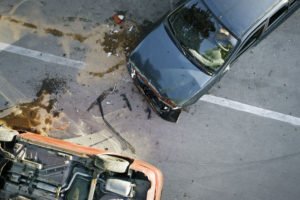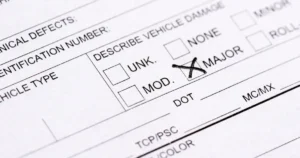 Brake-checking is when a driver purposely slams on the brakes to scare or intimidate another driver. This action frequently results in rear-end collisions, and the driver who rear-ends the car in front is usually found at fault.
Brake-checking is when a driver purposely slams on the brakes to scare or intimidate another driver. This action frequently results in rear-end collisions, and the driver who rear-ends the car in front is usually found at fault.
If you were injured in an accident with a driver who purposely slammed on his or her brakes, proving the other driver is liable for your injuries may be difficult on your own.
Call the car accident lawyers in South Bend to discuss your claim and learn how we may be able to help you prove liability and pursue the compensation you need.
Is Brake-Checking Illegal in Indiana?
Although brake-checking another driver is not mentioned in Indiana driving laws, the action may be perceived as reckless driving. A driver who is found guilty of reckless driving may be held liable for an accident and could face serious penalties, including jail time.
Evidence to Prove Brake-Checking
If it is safe for you to do so at the scene of the accident, you should take photos of the damage to the vehicles involved and tire marks on the road. Speaking to witnesses at the scene and gathering their contact information may also be helpful, as it may be difficult to track them down later.
Proving the driver in front of you purposely hit the brakes may take a thorough investigation. The work that goes into this may be difficult for accident victims who do not have the time or suffered severe injuries. Our attorneys are prepared to use the resources available to us to gather evidence to help prove the other driver may be at fault, such as:
- Police reports
- Witness statements
- Traffic camera/surveillance footage
We may also need to work with an accident reconstruction expert.
Can a Brake-Checking Claim be Denied?
If you are successful in proving your rear-end accident was caused by a driver’s brake-checking, the insurance company may try to deny the claim based on brake-checking being an intentional act.
In Indiana, an intentional act is defined as “an act intended to cause injury, although not necessarily the precise injury or severity of damage that in fact occurs.” The state Supreme Court has held that this type of action falls within an insurance policy’s intentional acts exclusion clause and so an insurer may deny a claim for this reason.
However, it is important to note that a driver’s intent when brake-checking is usually to intimidate, scare or warn another driver and may not always be done with the intention of causing an accident.
If your claim for a brake-checking accident is denied under the intentional acts exclusion of a driver’s liability insurance, our attorneys may still be able to build a case on your behalf, depending on the facts of your case.
Do not let a denied claim keep you from fighting for the compensation you need. Let our skilled attorneys help you.
Modified Comparative Negligence
The insurance company may also try to deny your claim by saying you were partially at fault for the accident if you were following too closely. This tactic is used by insurers who bet on injury victims not understanding their rights as insurance policyholders in Indiana.
The state’s modified comparative negligence laws allow a driver who is partially at fault for an accident to recover compensation if he or she is less than 50 percent at fault. The only problem is that your compensation may be reduced by whatever percentage you are found at fault.
Tips to Avoid a Brake-Check Accident
Drivers who brake-check others on the road usually do so because they become frustrated with slow drivers, heavy traffic or as revenge on drivers who previously cut them off.
Driving in a certain manner may help you avoid a brake-check accident:
- Drive the speed limit
- Follow at a safe distance
- Use the left lane only to pass others
- Drive defensively
- Avoid drowsy driving
- Pay attention to your surroundings
We Are Prepared to Help. Call Today
Proving fault for a brake-check accident takes time, resources and skill that our firm is ready to provide, all at no out-of-pocket cost to you.
Our attorneys have a track record of success building strong cases on behalf of our clients and successfully recovering the compensation they need for medical bills, lost wages and other damages.
We do not charge you anything up front or while we work on your claim, so there is no risk to you.
Call us today to schedule a free consultation: (574) 444-0741




